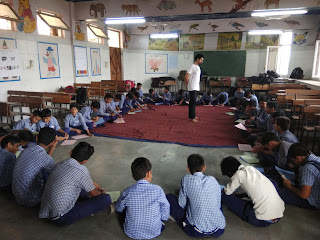“I want to create
Robots and become a big scientist one day”
“I like English
language, I also like to hear and listen to English songs and one day I will go
to America”
“I want to become
richer than Bill gates”
We began our “Gender,
sexuality and reproductive health curriculum” with 40 students of Government
school, Dwarka sec-3 with our first session on “Who am I?” The 2 hour workshop
began with the sharing of the intention of the curriculum, a brief account of
our work at Sahas and why we are working with adolescents! Then we engaged on
the agreements with the participants which are pre-requisite for creating safe
sharing spaces for this workshop and coming ones so that they could share their
curiosities, questions, doubts and experiences without the fear of being judged.
To bring the focus of
participant’s energy and attention, we played “Ungli Dance” and suddenly they
were smiling, giggling and seemed lot relaxed as the barrier that was there
because of uncertainty just melted. In the next activity, the participants were
invited to dwell more on their identity by filling a sheet of 15 questions
individually – questions like who is your favorite teacher, what you like most
about your school, who loves you most?, what is your dream or whom do you hate
most?
After this, the
participants were invited to create their individual identity cards, which are different
from the usual identity cards that we have. Here, they were asked to fill the
words or things that they associate with themselves- like what they like to do,
their hobbies, or anything they associate with their identity. This activity
reflected in detail the socio-economic identity that the participants associate
with themselves. Their dreams and aspirations were unique, unlikely of mundane
jobs like becoming a doctor or Engineer, also the curiosity to earn money,
learning English indicated how they want to change their socio-economic
identity.
For me, it was wonderful because they were not scared to dream irrespective
of their socio-economic class; however it was scary at the same time because to
have these certain notions may lead them to fall in the rat race forgetting
their own skill sets or values, they may become over competitive and lose the
very innocence which made them endearing.
Another aspect that
stood out during these conversations pointed towards peer pressure- there were
so much expectations on how their friends should be- one of them even suggested
that the friend should be smart and good looking.
Few points that caught
our attention were-
One of the boy
mentioned things that he doesn’t do and don’t like in his identity – not even a
single sentence had “I like to.”
Few of them said they
love cooking.
None of the boys
mentioned “Being boy” as their identity.
Most of them constantly
pointed out that they don’t like fighting, they dislike that so many fights
happen in the school, also teachers many a time don’t stop these fights, one of
the person stated that he really liked attending parties and dancing in the
parties
I was particularly
amused when a participant shared his likes with a constant post word as “Mazza
aata hai”
Then we engaged on how
identity changes during the course of life- it was interesting that the
participants could actually decipher it without much help. In the next part of
the workshop, to help them understand how important is adolescence and dwelling
into their identity and values at this point – we shared stories of Gandhi ji
and Rani Laxmi Bai when they were adolescents.
“So, Girls are not
weak, they can do whatever boys can do” a boy shared after
hearing Rani Laxmi Bai’s story.
In the last activity “catch
the ball and tell me one thing” was beautiful and struggle some in many ways-
the participants were finding it so difficult to share one good quality about
themselves and they either ended up sharing their dreams or regular sentences
like “helping others”.
This workshop was very
different in many ways- the boys were thinking deeply and were engrossed in
writing the “Myself” questionnaire as well as identity map, I was glad that
they could focus on themselves and be honest at the time of sharing. It seems
like the journey with these 40 adolescent boys would be a unique roller coaster
ride !










No comments:
Post a Comment